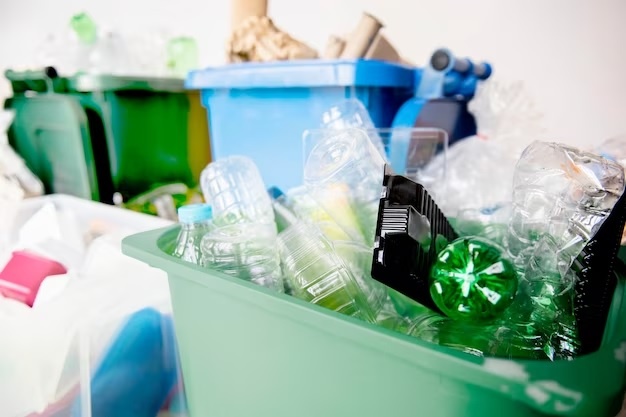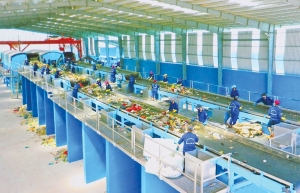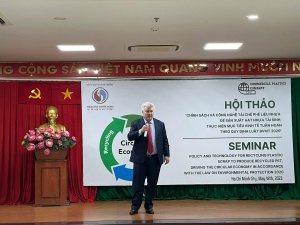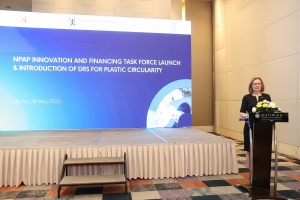Plastic recycling efforts kick into gear
 |
| Plastic recycling efforts kick into gear, illustration photo/ Source: freepik.com |
Vietnam’s plastic recycling industry is currently garnering the interest of potential investors. Fifteen Taiwanese recycling companies recently arrived in Vietnam in search of investment opportunities, according to Tran Viet Anh, president of the Vietnam Waste Recycling Association, on November 15 during the Mekong Connect 2023 forum.
Anh said that investing in the recycling of plastic waste yields numerous advantages, including the prevention of environmental issues, the conservation of nonrenewable resources like oil, and energy savings during the production of new plastic.
“Sustainability trends are presenting the recycling industry with advantageous prospects, and Vietnam spends about $10 billion each year importing plastic raw materials,” Anh said.
Investing in recycling is seen as a viable remedy to offset the scarcity of unprocessed plastic materials. The plastic industry will require about 10 million tonnes of plastic raw materials for export and production in 2023. However, domestic supplies will only be sufficient to meet 2.6 million tonnes, and the remainder will have to be imported.
Anh predicted that the raw material deficit will become more pronounced within the following two years as the government enforces stricter regulations regarding the importation of waste plastic.
A roadmap to restrict the production and import of single-use plastic products, biodegradable plastic packaging and products, and commodities containing microplastics was outlined in a 2022 decree. According to the decree, Vietnam will cease production and importation of non-biodegradable plastic bags measuring less than 50x50cm as of 2026.
After 2030, the decree mandates the cessation of production and importation of single-use plastic products, non-biodegradable plastic packaging, and commodities and products that contain microplastics.
The ability of businesspeople to generate a transient cycle for plastic products is contingent upon the collection and classification of plastic refuse in an ideal world, and is presently a deficiency in Vietnam’s recycling sector, Anh said. The Ministry of Natural Resources and Environment estimates that only 27 per cent of the approximately 1.8 million tonnes of plastic waste that is dumped into the environment annually in Vietnam is recycled, which is in stark contrast to initial expectations.
Beverage manufacturers in Vietnam that use receptacles composed of recycled PET plastic (rPET) are unable to circumvent exorbitant expenses. By collaborating with DuyTan Plastic Recycling to collect and recycle 11,000 tonnes of plastic waste between now and 2027, LaVie, a subsidiary of Nestlé, can potentially rectify this predicament. LaVie is compelled to import rPET from Europe at a premium of 30-50 per cent compared to new plastic.
LaVie’s action demonstrates not only the objective of cost reduction but also the substantial demand for rPET among bottled beverage manufacturers, thereby encouraging additional investments in this sector by businesses. The implementation of rPET is a component of LaVie’s strategy to recycle 100 per cent of product packaging by 2025. This is consistent with Nestlé’s vision that none of its packaging gets thrown away after use.
General director of LaVie Fausto Tazzi stated that the company’s use of bottles composed of 50 per cent rPET contributes significantly to the effort to limit the introduction of new plastics into the environment.
“We not only intend to be 50 per cent rPET but also to be able to launch products using bottles made entirely of it,” Tazzi said.
These rPET bottles were initially applied to LaVie’s 700-ml natural mineral water product, and the company anticipates expanding its product line in response to the raw material supply on the market.
“A process is necessary to categorise plastic bottles at the source, from consumers to collectors,” said Le Anh, director of sustainable development at DuyTan Recycling at VIR’s sustainable development conference on November 16.
“The critical issue is not only recycling solutions. DuyTan collects 90 tonnes of plastic refuse daily, but only half of it complies with bottle recycling standards. The remainder is used to recycle lower-quality products, such as fibres,” Anh continued.
An illustration of this can be seen in DuyTan’s plastic bottle recycling rate of as high as 50 per cent. This rate is the result of a well-oiled supply chain. Le Anh posits that the implementation of safety regulations pertaining to products fabricated from recycled plastic would yield favourable outcomes for plastic classification and recycling, which are presently the most problematic aspects of this industry.
| On December 4 at COP28, the “Nature, Land Use, and Oceans Day” event was held to debate adaptation strategies that simultaneously benefit the environment and climate, such as the recycling of plastic refuse. An estimated 3.1 million tonnes of plastic refuse are generated annually on land in Vietnam, with between 280,000 and 730,000 tonnes of waste discharged into the ocean, according to a 2022 World Bank report. The country is therefore among the world’s greatest producers of plastic refuse. |
 | Sustainable thinking ramps up in Vietnam Manufacturers in Vietnam are promoting the recycling, collection, and treatment of waste and disposable plastic packaging, as well as more environmentally friendly products. |
 | Seminar held on recycling plastic waste Responding to World Environment Day 2023, the Centre of Natural Resources and Environment Communications, under the Ministry of Natural Resources and Environment, held a seminar on May 18 on policy and technology for recycling plastic scrap to produce recycled PET, while driving the circular economy. |
 | New task force launched for plastic waste reduction in Vietnam A new task force was launched by the Vietnam National Plastic Action Partnership (NPAP) on May 18 to promote innovation and catalyse investment in effective solutions for reducing plastic waste and pollution in Vietnam. |
What the stars mean:
★ Poor ★ ★ Promising ★★★ Good ★★★★ Very good ★★★★★ Exceptional
Related Contents
Latest News
More News
- PM outlines new tasks for healthcare sector (February 25, 2026 | 16:00)
- Ho Chi Minh City launches plan for innovation and digital transformation (February 25, 2026 | 09:00)
- Vietnam sets ambitious dairy growth targets (February 24, 2026 | 18:00)
- Masan Consumer names new deputy CEO to drive foods and beverages growth (February 23, 2026 | 20:52)
- Myriad risks ahead, but ones Vietnam can confront (February 20, 2026 | 15:02)
- Vietnam making the leap into AI and semiconductors (February 20, 2026 | 09:37)
- Funding must be activated for semiconductor success (February 20, 2026 | 09:20)
- Resilience as new benchmark for smarter infrastructure (February 19, 2026 | 20:35)
- A golden time to shine within ASEAN (February 19, 2026 | 20:22)
- Vietnam’s pivotal year for advancing sustainability (February 19, 2026 | 08:44)

 Tag:
Tag:




















 Mobile Version
Mobile Version